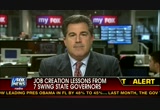it off, pay your taxes, go into a roth i.r.a., bonus yourself out early, buy your capital equipment this year, get 100% expensing, postpone your costs till next year, take your revenues this year. i mean, i know some companies that are bonussing all of their family employees, the owners, not going to take income next year. there are lots and lots of ways. we have lots of evidence how that happened in 2010 to 2011. >> right. >> also when reagan did it the other way, it was a huge difference. 1981 to 1982 was zero real growth. my guess is, paul, that this year has been inflated way beyond what it should be. it's not meade evenin mediocre,s terrifying. my guess, i'm wrong a lot, but if we go into 2013, i'll see us drop off substantially. >> the obama administration economic official a couple weeks ago, he said, look, this tax argument really doesn't work. if you just raise taxes on capital gains, dividends, on the higher incomes, that's going to have almost a negligible impact on the economy. the big one that really matters is on the middle class and president obama wants to extend tho

















































